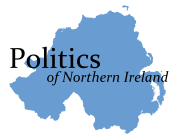Cross-community vote
 |
| This article is part of a series on the politics and government of Northern Ireland |
|
|
|
|
Northern Ireland in the UK
|
|
Northern Ireland in the EU |
|
|
|
British politics portal |
A cross-community vote or cross-community support is a form of voting used in the Northern Ireland Assembly according to the provisions of the 1998 Belfast Agreement.[1] It requires the support of both main communities in Northern Ireland, in other words majority of unionists and the majority of nationalist members of the Assembly.[2] It is also used to a lesser extent at local government level.
Background
Upon taking their seats members of the Northern Ireland Assembly are required to designate themselves as either "unionist", "nationalist" or "other". MLAs are free to designate themselves as they see fit, the only requirement being that no member may change his or her designation more than once during an Assembly session.[3]
A vote will not automatically require cross-community support. A "Petition of Concern" must first be presented to the Speaker by at least 30 of the 108 members. In a cross-community vote the majority of unionists and the majority of nationalist votes are required to pass a motion put to the Assembly.[4]
Designations
| Designations | 1998 | 2003 | 2007 | 2011 |
|---|---|---|---|---|
| Unionist | 58 | 59 | 54 | 56 |
| Nationalist | 42 | 42 | 44 | 43 |
| Other | 8 | 7 | 10 | 9 |
Note: These figures include the assumed designation of the Speaker who, having a non-partisan role, does not officially declare a designation.
Parties
List of current and previous assembly parties by designation.
Unionist
| DUP | |
| NI21 | |
| NI Unionist | |
| PUP | |
| UKIP | |
| UK Unionist | |
| UUP | |
| United Unionist Coalition |
Nationalist
| Sinn Féin | |
| SDLP |
Other
| Alliance | |
| Green (NI) | |
| NI Women's Coalition |
See also
- Consociationalism
- Demography and politics of Northern Ireland
References
- ↑ Minority Veto Rights in Power Sharing Systems: Lessons from Macedonia, Northern Ireland and Belgium by Shane Kelleher
- ↑ Section 3.7 - Standing Orders of the Northern Ireland Assembly - PDF file from the Assembly website.
- ↑ Section 3 - Standing Orders of the Northern Ireland Assembly - PDF file from the Assembly website.
- ↑ Section 27 - Standing Orders of the Northern Ireland Assembly - PDF file from the Assembly website.
External links
- Official website
- "The Nature of the British-Irish Agreement" by Brendan O´Leary
| ||||||||||||||||||||||||||||||||

